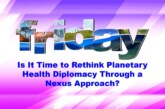Excerpts from an interview of Ms. Helena Thybell, Executive Director, Stockholm International Water Institute (SIWI) by Dr. Arvind Kumar, Editor, Focus Global Reporter
She holds a bachelor’s degree in social science from Lund University and has pursued studies in leadership, sustainability, and strategic development. From 2019 to 2023, she served as CEO of Save the Children Sweden, leading major organizational transformation and global strategy initiatives. Previously, she was Head of HR and People and Culture at H&M Group and CEO of both the H&M Foundation and the Swedish Postcode Foundation. With experience in the Swedish Red Cross and Save the Children International, she has championed social innovation, gender equality, and sustainable development worldwide.
INTERVIEW
EDITOR: Can you tell us a little about yourself, and how does it feel in your new role as Executive Director at SIWI?
MS. HELENA THYBELL: It’s an enormous privilege to lead SIWI at this moment in time. The organization has such a respected legacy and a remarkable team of experts who are genuinely driven by impact. Joining SIWI has confirmed for me how powerful it is when knowledge, credibility, and collaboration come together in one place. You feel the collective purpose immediately — and that’s both humbling and inspiring.
My own background spans both the private and non-profit sectors. I spent many years at H&M Group as Head of HR and People & Culture, helping to shape global leadership and organizational transformation. More recently, I served as CEO of Save the Children Sweden, where we worked to ensure that children’s rights were respected and protected in the most complex humanitarian and development contexts. These experiences have taught me the importance of purpose-driven leadership, partnership, and the ability to translate vision into measurable change.
At SIWI, my focus is on leading the organization through its next phase of renewal and focus. We’re sharpening our strategy to make sure that our knowledge and convening power translate directly into improved water governance and resilience around the world. It’s an exciting time — not only for SIWI, but for the water community as a whole — as water is finally being recognized as the connector across climate, nature, and development.
EDITOR: As SIWI positions itself as a leading expert in creating spaces and facilitating critical collaborations for improved water governance, what are the key partnerships and collaborative frameworks you’re prioritizing for 2025-2030?
MS. HELENA THYBELL: Partnership is at the core of SIWI’s identity — it’s how we create real impact. Our two flagship frameworks, World Water Week and the Water for Climate Pavilion at the UN climate COPs, are central to that effort. They are where science meets policy, and where dialogue turns into collaboration and measurable action.
World Water Week has long been a world leading conference on water and cross-sectoral collaboration. In the coming years, we will strengthen its role as a bridge between global processes, including the Rio Conventions, and the implementation of national and local solutions. We’re building stronger year-round engagement around the Week, connecting outcomes to climate, biodiversity, and desertification agendas so that water is recognized as a systems connector across all.
At the same time, the Water for Climate Pavilion at the COPs has become an increasingly important space for collaboration. At COP30 in Belém, the Pavilion will bring together governments, development banks, civil society, and the private sector to anchor water within climate action — from finance to adaptation. Both frameworks are underpinned by long-term partnerships with organizations such as UN-Water, AGWA, the European Investment Bank, and numerous regional networks.
In essence, SIWI acts as a bridge — connecting research and innovation with governance and implementation. By aligning our work across World Water Week, the COPs, and other global milestones, we ensure that water is not just part of the conversation but central to the solutions.
EDITOR: World Water Week 2025 focused on “Water for Climate Action.” How is SIWI translating this theme into concrete policy recommendations and actionable solutions for governments and international organizations working on Nationally Determined Contributions (NDCs) and National Adaptation Plans (NAPs)?
MS. HELENA THYBELL: The 2025 theme, Water for Climate Action, captures the growing realization that climate resilience begins and ends with water. People experience climate change through floods, droughts, and the loss of water security, yet adaptation planning often overlooks it. SIWI is working to change that by helping countries and partners systematically integrate water into their climate commitments and plans.
Through our policy and research work, we provide evidence-based guidance that supports governments in embedding water across their Nationally Determined Contributions (NDCs) and National Adaptation Plans (NAPs). This includes tools for governance reform, financing strategies for nature-based solutions, and frameworks for multi-sector coordination. Our capacity development programmes also strengthen institutional readiness, ensuring that commitments made at the global level can be implemented locally.
At the same time, we use platforms like World Water Week and the Water for Climate Pavilion to translate knowledge into policy insights. For instance, at COP30, we are calling for the operationalization of the UAE–Belém Framework for Global Climate Resilience, which would set water-related adaptation targets and indicators. By aligning our convening work with policy processes, we help create a feedback loop, from science and innovation to national policy and back again.
Our goal is not just to produce recommendations but to co-create actionable solutions that countries can adopt and scale. In that sense, SIWI’s work is about turning dialogue into delivery.
EDITOR: The Water for Climate Pavilion, coordinated by SIWI, has become a significant platform at COP conferences. What specific outcomes and commitments are you targeting for COP30 in Belém?
MS. HELENA THYBELL: COP30 is a milestone, not only for climate negotiations but for the integration of water as the foundation of resilience. SIWI’s coordination of the Water for Climate Pavilion, in partnership with leading organizations and networks, is about creating a dedicated space for solutions, partnerships, and accountability.
This year, our main goal is to ensure that water becomes fully embedded in the implementation of the Paris Agreement. Specifically, we are calling for three outcomes. First, the adoption and operationalization of global adaptation targets for water under the Global Goal on Adaptation, including clear indicators and measurable progress tracking. Second, recognition of water’s central role in the new global climate finance goal — ensuring that funding for adaptation, ecosystem protection, and loss-and-damage avoidance directly supports water-related interventions. Third, stronger delivery mechanisms that connect finance to local action, empowering communities and Indigenous Peoples to lead adaptation where it matters most.
We’re also emphasizing equity and inclusion. No climate transition can be just if communities are left without safe water. Through the Pavilion, SIWI and its partners are showcasing how justice and resilience are interconnected, from women’s leadership in WASH and ecosystem restoration to inclusive, nature-based solutions.
Our ambition is that COP30 in Belém will move from words to implementation.
EDITOR: India Water Foundation emphasizes localizing SDGs and working at grassroots levels, particularly with marginalized communities. How can SIWI’s water governance expertise support South Asian countries, especially India, in implementing community-driven water solutions that align with climate adaptation strategies?
MS. HELENA THYBELL: The challenges facing South Asia, from rapid urbanization to water scarcity and climate extremes, highlight why governance and community engagement must go hand in hand. SIWI’s role is to help connect the dots between local innovation and national policy, ensuring that community-led water management becomes central to adaptation planning.
Our expertise lies in building governance capacity: strengthening institutions, facilitating inclusive dialogue, and co-creating tools that help decision-makers translate global frameworks into local realities. We work with partners to develop and share governance models that integrate human rights, gender equality, and transparency into water management.
In India and across the region, SIWI can support initiatives that enhance the enabling environment for community action. This includes designing policy frameworks that recognize local and Indigenous knowledge, strengthening the role of women and youth in decision-making, and developing financial mechanisms that allow local actors to access adaptation funding directly.
The goal is not to import solutions but to help scale what works, connecting bottom-up approaches with the national commitments under the Nationally Determined Contributions (NDCs) and National Adaptation Plans (NAPs). In that sense, SIWI acts as both a knowledge partner and a bridge-builder, ensuring that community-driven water governance becomes a foundation for climate resilience across South Asia.
EDITOR: What role does SIWI see in supporting transboundary water cooperation through initiatives like the Shared Waters Partnership?
MS. HELENA THYBELL: Transboundary cooperation is at the heart of SIWI’s mission. Through the Shared Waters Partnership, we help countries and regions transform potential water-related tensions into opportunities for collaboration and peacebuilding. Many of the world’s river basins cross political boundaries, and as climate change increases variability and pressure, cooperation becomes not only beneficial but essential for stability.
This year, SIWI also supports the launch of the Routledge Handbook of Water Diplomacy, a global collaboration co-edited by SIWI’s Dr. Martina Klimes with partners from Tufts University, UNC, and UNESCO. The handbook offers concrete, practice-oriented tools for turning water from a source of conflict into a catalyst for peace and resilience. It builds directly on lessons from the Shared Waters Partnership and other SIWI initiatives, emphasizing that trust, inclusivity, and dialogue are as vital as data and infrastructure.
Our experience shows that when water governance is transparent, participatory, and equitable, it builds the trust that underpins peace, economic development, and resilience, exactly the vision the Handbook and SIWI both promote.
EDITOR: How is SIWI working to ensure that Indigenous Peoples, youth, and marginalized communities have formal roles in water governance processes, particularly given the successful Indigenous Peoples Focus at World Water Week 2025?
MS. HELENA THYBELL: Inclusion is not an afterthought for SIWI, it’s a guiding principle of how we work. Water governance must reflect the diversity of people and perspectives it affects. That’s why we’re taking active steps to ensure that Indigenous Peoples, youth, and marginalized communities have formal and meaningful roles in decision-making.
At World Water Week 2025, we were proud to host the strongest Indigenous Peoples Focus yet, highlighting the leadership, rights, and knowledge systems of Indigenous communities. These efforts are not limited to the Week itself. Across our programmes, we embed human rights-based and gender-responsive approaches to water governance, ensuring that participation is equitable and voices traditionally excluded are heard.
Our approach goes beyond representation. We are co-developing partnerships and knowledge products with Indigenous networks and youth-led organizations so that their priorities are integrated into global and regional dialogues. For instance, SIWI supports the development of accessible, multilingual content and capacity-building tools designed specifically for underrepresented groups.
Inclusion strengthens governance quality. By integrating diverse perspectives and local knowledge, water solutions become more effective, more just, and ultimately more sustainable. That is how we define meaningful participation at SIWI, not symbolic, but transformative.
EDITOR: Looking at the international water landscape, where do you see SIWI focusing its efforts in the coming years?
MS. HELENA THYBELL: The next few years will be decisive for global water action. Between COP30 in Belém, the Rio Convention COPs in 2026, and the UN Water Conference in 2026, we have a unique opportunity to elevate water as the connector between climate, nature, and sustainable development.
SIWI’s focus will be on continuity and coherence, ensuring that these global milestones reinforce each other and that insights are captured and applied in practice. Our recent collaboration on the Routledge Handbook of Water Diplomacy reflects this vision: helping practitioners around the world apply the principles of dialogue, trust-building, and adaptive governance that SIWI has championed for decades.
Through World Water Week and the Water for Climate Pavilion, we will continue to bridge science, policy, and diplomacy. The coming years will be about scaling what works, empowering people, institutions, and governments to act together.






